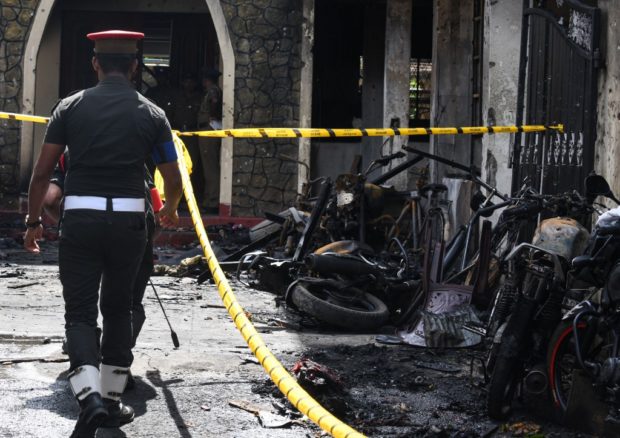
Sri Lankan security personnel walk past debris outside Zion Church following an explosion in Batticaloa in eastern Sri Lanka on April 21, 2019. – A series of eight devastating bomb blasts ripped through high-end hotels and churches holding Easter services in Sri Lanka on April 21, killing nearly 160 people, including dozens of foreigners. (Photo by LAKRUWAN WANNIARACHCHI / AFP)
Sri Lankan authorities have blocked most social media services in the country following the Easter Sunday attacks that killed more than 200 people, a group that monitors internet censorship said.
The NetBlocks observatory said it detected an intentional nationwide blackout of popular services including Facebook, YouTube, WhatsApp, Instagram, Snapchat and Viber.
Sri Lankan officials said they were temporarily blocking social media to curtail the spread of false information and ease tensions.
The defense ministry said the shutdown would extend until the government concludes its investigation into the bomb blasts that rocked churches, luxury hotels and other sites.
NetBlocks cautioned that such post-attack blackouts are often ineffective.
“What we’ve seen is that when social media is shut down, it creates a vacuum of information that’s readily exploited by other parties,” said Alp Toker, executive director of the London-based group. “It can add to the sense of fear and can cause panic.”
The group said its monitoring of Sri Lankan internet connectivity found no disruptions to the fundamental infrastructure of the internet, meaning the blackout was directed at specific services.
Some social media outlets, such as Twitter, appeared unaffected, but the blockage affected popular messaging services.
“That’s going to be a problem for people trying to communicate with friends and family,” Toker said.
Some internet users are circumventing the social media blocks by using a virtual private network, which masks the location of a computer, Toker said.
It isn’t the first time Sri Lanka has blocked social media. The government imposed a weeklong ban in March 2018 because of concerns that WhatsApp and other platforms were being used to fan anti-Muslim violence in the country’s central region.
An analysis by Sri Lankan researcher and author Yudhanjaya Wijeratne of thousands of Facebook posts made during last year’s ban found that many Sri Lankans simply found ways around it.
Wijeratne has recommended narrower and more “technically challenging” approaches to curbing hate speech, such as better detection and strengthening local laws.
Facebook, which owns WhatsApp and Instagram, has struggled in recent years to combat the use of its platforms to incite violence and spread hate messages and political propaganda in countries including India, Myanmar and the United States.
The company said in a statement Sunday that it has been working to support first responders and law enforcement in Sri Lanka and identify and remove content that violates company standards.
“We are aware of the government’s statement regarding the temporary blocking of social media platforms,” the company said. “People rely on our services to communicate with their loved ones and we are committed to maintaining our services and helping the community and the country during this tragic time.” /gsg